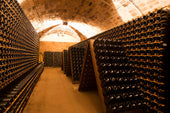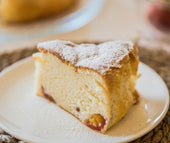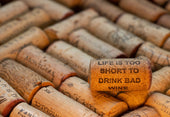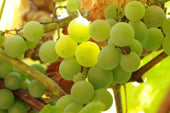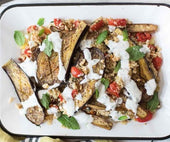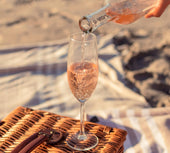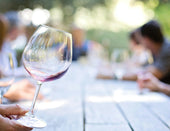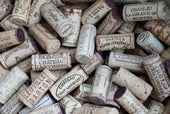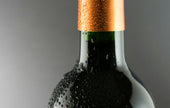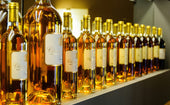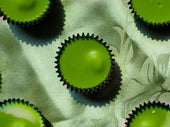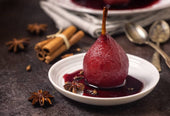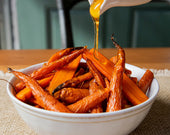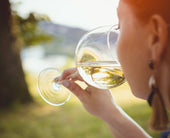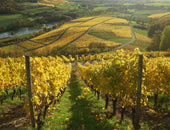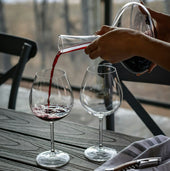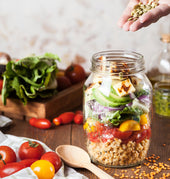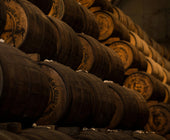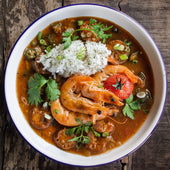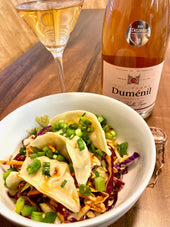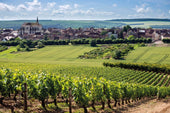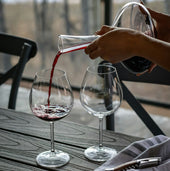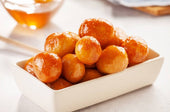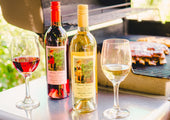
Winemaker Spotlight with Tony Soter
We are honored to kick off our Winemaker Spotlight series with Tony Soter of Soter Vineyards. Tony started in 1975 and worked with wineries such as Stag's Leap, Spring Mountain, Chappellet and Sequoia Grove just to name a few. He eventually bottled his own label under the Etude brand. With Pinot Noir at heart, Tony finally left Napa Valley and moved to Oregon to start Soter Vineyards in Willamette Valley, Oregon. In 2009, Tony established the Planet Oregon label to make "delicious, environmentally responsible wine at an accessible price".
Some would call it coincidence, others would call it serendipity. However, it was the love of food and wine that brought two school buddies from Southern California together. Bottle Shop's own Culinary Specialist Leo Coulourides and Tony Soter have known one another for many years, pre-wine and pre-Claremont. Leo with his experience as a restaurateur and chef, have been able to reconnect with Tony thru time. We are delighted to present you what Tony has to say about Soter Vineyards, Planet Oregon, reducing carbon footprint, and Claremont. Special Note: Tony earned a philosophy degree from Pomona College before venturing into wine.PR: What was your wine experience after college?
TS: After college I knew only a few things for sure, I didn't want to live in So. Cal anymore (no offense but the smog was oppressive in those days) I didn't want to go to law school (advocacy did not always serve truth) and I would have to find some decent work if I were to sustain my new found interest in wine. Within a year I was working as an apprentice in Napa Valley. My first harvest was 1975.
PR: What was your experience of wine in college? Was there a particular wine that peaked your interest?TS: Let's be honest 40 years ago (I graduated in 1974) I drank far more beer! But I did have my interest cultivated by after subject hours classes by my classics professor Steven Glass. Prior to college only stories from my non-wine drinking parents about my grandfather and his immigrant cronies making their home made wine in the basement.
The first wines that made impressions were German Mosel and French Burgundy (Pinot Noir) from the 1971 vintage, thanks Steve!
PR: How do you connect back to the Claremont Community?
TS: I am still in regular contact with now retired professor Glass who is an avid wine collector and drinker we have maintained a bond in wine for nearly 4 decades. Steve still lives in Claremont with his wife Sandy.
PR: When you visit, is there a place you most want to see?
TS: Just a stroll through the Quad on the Pomona Campus will do to bring back the memories.
PR: How do you know Leo and Christina Coulourides?
TS: Leo and I were close friends in High School well before either of us had a relationship with wine or with Claremont. I wouldn't be the first one to say Christina was the best thing that ever happened to Leo and her upbringing with wine helped pull us all back together through fine food and wine.
PR: Oregon is a much wetter climate than California. How does that affect your harvest and production?TS: We made picking decisions based on the ripeness of the fruit and the development of the flavors and felt sure that our timing was perfect for picking. For the wines we source from vineyards outside of the estate, only the best fruit will be used and though our production might be lower than normal because of this attention, the quality and consistency will be there.
It isn't so much what you do during harvest that protects you from the sometimes negative side effects of rain, it is what you do during the growing season and we took the necessary steps in our vineyard early on in the growing season to ensure the health of the fruit and the quality of the wine. An example would be pulling many leaves very early in the season to create breezy causeways for air to pass around the clusters and to allow sunlight to create ideal microclimates for the developing fruit.
PR:What is your philosophy behind Planet Oregon?
TS: Planet Oregon is a wine we made with several things in mind. First was to make a classically Oregon Pinot Noir made with high quality fruit and with the highest of attention in winemaking. Second, we wanted to make something that was approachable for everyone in price, flavor and drinkability. This is an accessible wine and an utterly delicious and enjoyable one. Third and finally we wanted to make a wine that would act as a poster child to sustainable agricultural practices, especially in regards to viticulture. All of the vineyards we work with for Planet Oregon are sustainably certified. We have even gone so far as to help our vineyard partners to become certified in their practices.
PR: Is Planet Oregon produced and bottled at Soter Vineyards?
TS: Planet Oregon is made at an offsite location where we have additional space and technology at our disposal. During harvest James Cahill, our winemaker who is focused on Planet Oregon, and our North Valley wines is based in the offsite facility to ensure that the same attention to detail that goes into our estate wine goes into Planet Oregon. I spend my time back and forth from the estate property to our other facility in Dundee just a few miles away. Checking in with James or with Chris Fladwood our estate winemaker at Mineral Springs. Mostly I am in the field tasting fruit, assessing condition, and playing poker with the weather reports.
At Soter Vineyards we work in concentric circles all focused around one primary theme: sustainably grown Oregon Pinot Noir. The inner circle is our Mineral Springs Vineyard where Chris Fladwood the winemaker works in collaboration with Nadine Basile our vineyard manager who specializes in organic and biodynamic farming.
The area that surrounds us is known as the Northern Willamette Valley and this is where the concentration of the states best Pinot Noir is grown. This is the inspiration for our North Valley project utilizing grapes farmed by others but to our high standards and that represent the nuances of the several sub appellations of the region such as Dundee, Ribbon Ridge and Eola Hills to name three. We source from some of the best sites around and they are variously farmed to organic, LIVE or biodynamic standards. All certified sustainable.
We cast our widest net with Planet Oregon trying to take what we know and what we want to see happen in Oregon Viticulture state wide. While the sources are predominately Willamette Valley they are not limited there. We have sourced fruit from the east near Hood River, from Salem, Corvallis, and southern Oregon near Ashland.
PR: What is the biggest factor in reducing a winery's carbon footprint?
TS: The biggest factor for any of us in carbon consciousness is the most mundane parts counting your expenditures, it is not like mortgage payments or car payments or costs of anything in the customary way. Carbon accounting turned our whole business inside out because we had to start finding ways to measure in carbon units not $$. This was such a new field that there were not a lot of places or people to turn to that could help us with the new accounting. And it was not in anyone's job description.
While it is relatively easy to give it lip service, in practice it is much harder to institute the discipline of this awareness in your every action. But it is fundamental, because as someone said, you can not manage something you cannot count. Once we could count in the carbon language we could look at everything with a new lens.
We made packaging adjustments by cutting the weight of our bottles by 30-50%, cutting out metal and plastic cork covers. Currently we are down to recyclable lightweight glass, cork and paper labels. Of course we are going deeper, into paper sourcing, inks, cork processing details etc. Will we eliminate the bottle altogether? Its under debate but at the moment we are reasonably sure most of our customers would prefer we deliver a responsibly made wine in a traditional package of bottle and cork.
We have to remember that the first definition of sustainability is staying in business.
PR: How do you think the shift to sustainable winegrowing will effect the climate for the Oregon wine scene?TS: If you literally mean the Climate then we probably will not have a measurable impact alone as Oregon Wine producers. That will take global action. Or put another way it will take action not by a small number of producers but the much larger number of our customers
That is why the message behind PLANET OREGON is that consumers need to scrutinize all their wine purchases and reward sustainable products with their hard earned dollars. This has the effect of changing the status of such products in the market place and shifting demand to wines grown and made with more sustainable methods.
In just the last five years we have seen Oregon's certified sustainable grape acreage go from 20 percent to over 50%, that is rapid progress. And that says something about the times and Oregon as a place that values such commitments.
Today you can count on Planet Oregon Pinot Noir to be produced only from certified sustainable fruit and in a facility that earned similar status. But we want it to be a vanguard of what other producers can do by showing that it is what consumers want. Which is to say if we are successful others will emulate our commitments and that is most welcome competition. For all the focus on sustainability we never forget that the wine should be utterly delicious, compulsively drinkable, moderate in alcohol and delivered at an attractive price.
We like to thank Tony and his team at Soter Vineyards for this article. Your can find Planet Oregon Pinot Noir here at the Bottle Shop, it is certainly one of our staff favorite everyday Pinot.


